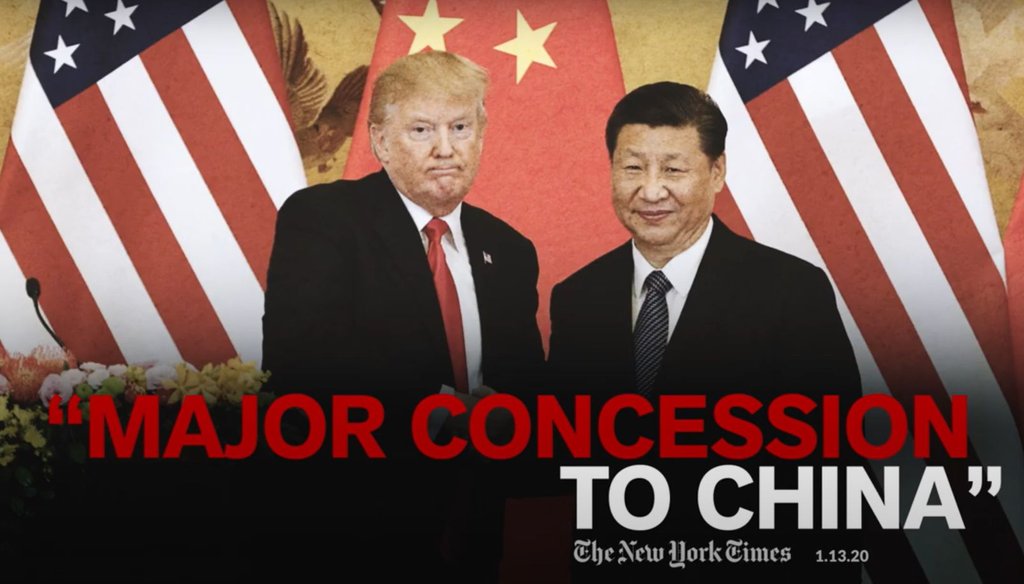Get PolitiFact in your inbox.

This is part of an ad from Joe Biden's presidential campaign that attacks President Donald Trump's trade policy with China. (Screenshot)
Did Donald Trump lose a trade war he started, as Joe Biden says?
If Your Time is short
• Longstanding Chinese trade policies provoked Trump, but by moving first to impose tariffs, he escalated existing trade tensions into a trade war.
• It may be premature to say that Trump has "lost" the conflict, but we found wide agreement that he is losing so far.
• Trump has not succeeded in getting China to capitulate to structural demands. The gains have been marginal and were undercut by significant retaliatory tariffs on the agriculture sector and wider harm to the economy.
Joe Biden, the presumptive Democratic presidential nominee, minced no words in attacking President Donald Trump’s trade policies in a recent ad.
The June 24 ad focuses on China and features multiple images of Chinese President Xi Jinping. (The ad was produced by the Democratic National Committee with Biden’s approval, and is targeted at Pennsylvania voters.) Here’s the key narration:
"Trump said he’d get tough on China. He didn’t get tough — he got played. Trump lost a trade war that he started. Farmers bankrupted. Steel workers betrayed. And manufacturing, in a recession. Donald Trump lost."
We checked with trade policy specialists, both those who are supportive of free trade and those who are more skeptical, and we found a general agreement that Biden’s point was reasonable, though it may be too soon to declare an irreversible loss for Trump.
Because the ad focuses on China, we will limit our discussion here to Trump’s policies on trade with China, as opposed to other countries. (The Trump campaign and the White House did not respond to inquiries for this article.)
Generally speaking, a trade war is "a confrontation between two or more countries that involves one country initiating an increase in its tariff rate against another country, usually over that country’s alleged wrongdoing," said Kent Jones, a professor of economics at Babson College. "This sort of provocation typically leads to the other country retaliating with tariffs of its own. The warfare often continues with escalating tariffs on both sides."
There’s a good argument that Trump started a trade war, experts say.
"It can fairly be said that Trump started the trade war with China by ignoring World Trade Association rules regarding disputes among members, which require both parties to submit to a review of the alleged wrongdoing by a WTO panel of legal experts before taking any unilateral action of their own," Jones said.
The U.S. has complained for years about Chinese trade practices. For instance, "the U.S. has complained over several presidential administrations about Chinese infringement of intellectual property rights," said Ross Burkhart, a Boise State University political scientist.
However, even if China’s action’s were provocative, experts agree that Trump pushed the existing trade tensions between the two countries to the point of a trade war.
For the United States, the typical mechanism is to invoke Section 301 of the 1974 Trade Act, which is used to punish trading partners deemed by the U.S. to be violating trade agreements or restricting U.S. commerce.
The Trump administration has invoked Section 301 tariff increases of 25% on several occasions starting in 2018. Collectively, the first four tranches of tariff increases were valued at $550 billion.
"Theoretically, if the country initiating the higher tariffs can get the other country to submit to its demands, change its behavior, or conclude a formal agreement to terms of capitulation, then one could say that a country has ‘won’ the trade war," Jones said.
But trade wars are difficult to win, experts agree. Typically, "the only issue is who will lose the most," said Barry Bosworth, an economist at the Brookings Institution.
It’s fair to say that China has not simply capitulated: It responded tit-for-tat to the U.S. tariff increases, including shifting its purchases of agricultural products to other countries.
It’s possible to look at a few metrics to determine which side is winning this particular trade war. None of them look especially promising for the president.
One is the balance of trade in goods between China and the United States. Initially, the trade deficit got worse under Trump but has improved modestly in the past year. (The impact of the coronavirus will make it hard to gauge improvements going forward.) Still, the balance of trade remains solidly in China’s favor.
Other metrics involve the U.S. manufacturing sector. In seeking to take on China, Trump had pledged to reverse the sector’s decline. Here’s a look at gross manufacturing output by quarter. Output grew during the first half of Trump’s tenure but declined slightly during the second half.
Featured Fact-check
Manufacturing employment showed a similar pattern under Trump, a rise followed by stagnation.
In all, the trade balance and the health of the manufacturing sector may have improved marginally. If that was the end of the story, Trump might be able to argue that he’s made progress, even if it’s short of Chinese capitulation.
But there are other significant downsides to Trump’s trade policy, experts say.
Most notably, the U.S. agriculture sector has been hit by retaliatory actions by China.
The U.S. Agriculture Department projected in February 2020 that agricultural exports to China would reach $14 billion in the fiscal year ending Sept. 30. That would be an increase of $4 billion over the prior year, but well short of the $40 billion Trump had pledged a month earlier.
Trump administration efforts to boost agricultural purchases were meant to reverse declines provoked by the U.S. tariffs in the first place. "Did Trump gain leverage to secure a ‘deal’ with China? Yes, he did. Is that deal any good? It’s doubtful," said Scott Paul, president of the Alliance for American Manufacturing.
The Trump administration has also paid compensation to farmers hurt by China’s policies worth at least $28 billion over two years. Despite this compensation, farm bankruptcies hit an eight-year high in 2019. And experts say that once the markets are lost, they may be gone for good.
The harm was also spread more widely than just the farm sector.
For starters, the money to compensate farmers comes from American taxpayers. Beyond that, the United States typically gets stuck with paying the tariffs it imposes, rather than China. Indeed, the impacts of the trade war filter throughout the economy.
"U.S. tariffs against Chinese manufactured imports disrupted U.S. supply chains, raising input costs to many U.S. firms that used these products," Jones said.
RELATED: Who pays for US tariffs on Chinese goods? You do
Independent observers have projected a net economic hit to the United States from the trade friction with China. A 2019 study by the Organization for Economic Cooperation and Development estimated that the tariff hikes could cut U.S. and Chinese GDP by 0.9% and 1.1%, respectively, by 2021-22.
In a December 2019 study, Federal Reserve researchers concluded that Trump's tariffs "have not boosted manufacturing employment or output, even as they increased producer prices." And the economic analysis firm Moody's concluded in September 2019 estimated that the trade conflict with China has reduced U.S. employment by 300,000 jobs.
A different Federal Reserve study from October 2019 found that tariffs on Chinese imports added about $800 annually per household, wiping out gains for the typical household under the 2017 Tax Cuts and Jobs Act.
Trade specialists told PolitiFact that it may be too soon to say that Trump has "lost" the trade war, as the pro-Biden ad said.
"It’s too early to say he ‘lost,’ but he obviously hasn't ‘won’ in the sense of getting meaningful, durable, market concessions greater than what he has given in return," said I.M. (Mac) Destler, an emeritus professor at the University of Maryland's Center for International Security Studies. "It isn't over yet, but he seems on track to lose."
Experts added that Trump’s approach has worsened the odds of success by not going through the World Trade Organization.
"The U.S. has lost its reputation as a reliable participant in the international economic order," Bosworth said.
The ad approved by Biden said, "Trump lost a trade war that he started."
Longstanding Chinese trade policies may have provoked Trump into acting, but by moving first to impose tariffs, Trump at the very least escalated existing trade tensions into a trade war.
And while it may be premature to say that Trump has "lost" the conflict, we found wide agreement among trade experts that he is losing. He has not succeeded in getting China to capitulate to structural demands. He’s made marginal gains in the U.S.-China trade balance and in U.S. manufacturing output. But those have been undercut by significant retaliatory tariffs for the agriculture sector and wider harm to the economy from higher prices, supply chain disruptions, and slower economic growth.
We rate the statement Mostly True.
Our Sources
Democratic National Committee, ad on behalf of Joe Biden, June 24, 2020
U.S. Census Bureau, balance of trade in goods with China, accessed June 30, 2020
Congressional Research Service, "Enforcing U.S. Trade Laws: Section 301 and China," June 26, 2019
Federal Reserve Board, "Disentangling the Effects of the 2018-2019 Tariffs on a Globally Connected U.S. Manufacturing Sector," December 2019
Daniel Mitchell, "Understanding the Trade Deficit," March 18, 2019
Washington Post, "China could purchase much less U.S. farm product than thought, new USDA estimate suggests," Feb. 20, 2020
Reuters, "U.S. farm bankruptcies hit an eight-year high: court data," Jan. 30, 2020
ABC News, "President Trump's tariffs have hurt US manufacturers, Fed study says," Dec. 30, 2019
CBS News, "Is Trump right that Americans' incomes have risen $7,000 since he took office?" Oct. 24, 2019
Bloomberg, "U.S. Farms Face Long-Term Losses From Trump Trade War, BCG Warns," Oct. 9, 2019
NPR, "Farmers Got Billions From Taxpayers In 2019, And Hardly Anyone Objected," Dec. 31, 2019
PolitiFact, "Who pays for US tariffs on Chinese goods? You do," May 14, 2019
Email interview with Dean Baker, co-founder of the Center for Economic and Policy Research, June 26, 2020
Email interview with Daniel Mitchell, free-market economist, June 25, 2020
Email interview with Kent Jones, professor of economics at Babson College, June 25, 2020
Email interview with Ross Burkhart, Boise State University political scientist, June 25, 2020
Email interview with I.M. (Mac) Destler, emeritus professor at the University of Maryland's Center for International Security Studies, June 25, 2020
Email interview with Scott Paul, president of the Alliance for American Manufacturing, June 26, 2020
Email interview with Barry Bosworth, economist at the Brookings Institution, June 26, 2020
Browse the Truth-O-Meter
More by Louis Jacobson
Did Donald Trump lose a trade war he started, as Joe Biden says?
Support independent fact-checking.
Become a member!
In a world of wild talk and fake news, help us stand up for the facts.










































